As cryptocurrencies gain popularity, businesses are increasingly looking to accept crypto payments to engage with global customers and lower transaction costs. Crypto payment gateways streamline these transactions, making them vital for international operations. Below is a comprehensive overview of the top 10 cryptocurrency payment gateways that provide security, reliability, and seamless integration for businesses aiming to broaden their payment options.

Table of Contents
ToggleHow to Choose the Best Crypto Payment Gateways for Your Business
Selecting the appropriate cryptocurrency payment gateway for your business is a critical strategic choice that requires thoughtful consideration. Here’s a guide to assist you in evaluating your options and selecting the best gateway for your needs:
- Identify Your Needs: Align the gateway with your business type, customer demographics, and transaction volume.
- Supported Cryptocurrencies: Opt for a gateway that allows the cryptocurrencies you wish to accept. For instance, CoinPayments supports thousands, while others may offer a more limited selection.
- Review Fees: Assess both per-transaction and payout fees to maintain manageable costs.
- Integration: Confirm compatibility with your existing platform and ensure reliable customer support.
- Security & Compliance: Seek gateways with robust security features and adherence to local regulations.
- Fund Access: Determine whether you require immediate or delayed settlements and the ability to convert crypto to fiat.
- Privacy Considerations: If privacy is paramount, consider non-custodial or decentralized gateways like BTCPay Server.
- Additional Features: Assess added benefits like POS systems, loyalty programs, or multilingual support.
How a Cryptocurrency Payment Gateway Works
A cryptocurrency payment gateway enables businesses to accept crypto payments by securely processing and converting these transactions into fiat or directly depositing cryptocurrency into a merchant’s wallet. Here’s a straightforward outline of how this typically functions:
- Customer Chooses Crypto Payment: During checkout, the customer opts to pay with cryptocurrency.
- Payment Request Generation: The payment gateway creates a unique payment request, usually as a QR code or payment link, which includes the necessary cryptocurrency amount and destination wallet address.
- Customer Sends Payment: The customer transfers the specified cryptocurrency amount from their digital wallet to the merchant’s wallet address within a designated timeframe to secure accurate exchange rates.
- Transaction Verification: The payment gateway verifies the transaction on the blockchain, a process that may take anywhere from a few seconds to several minutes, depending on the cryptocurrency and network congestion.
- Conversion to Fiat (Optional): Some gateways provide immediate conversion to fiat currencies (like USD or EUR), shielding merchants from cryptocurrency price fluctuations by depositing the converted amount into the merchant’s bank account or designated crypto wallet.
- Transaction Confirmation: Once the payment is verified and processed, the gateway sends a confirmation to both the merchant and the customer, completing the transaction.
Best Crypto Payment Gateways
1. Coinbase Commerce

Coinbase Commerce is a popular cryptocurrency payment gateway backed by Coinbase, one of the largest cryptocurrency exchanges globally. It enables businesses to accept Bitcoin, Ethereum, and several other cryptocurrencies.
Key Features:
- Direct-to-wallet payments, allowing businesses full control over their funds.
- Easy integration with eCommerce platforms like Shopify.
- Transparent transaction fees with no extra charges for withdrawals.
Pros:
- High level of security supported by Coinbase’s infrastructure.
- Instant settlement options available.
- User-friendly dashboard.
Cons:
- Limited cryptocurrency options compared to other gateways.
- Not available in all countries.
Also Read: 10 Best AI Tools for Audio Repair in 2024
2. BitPay
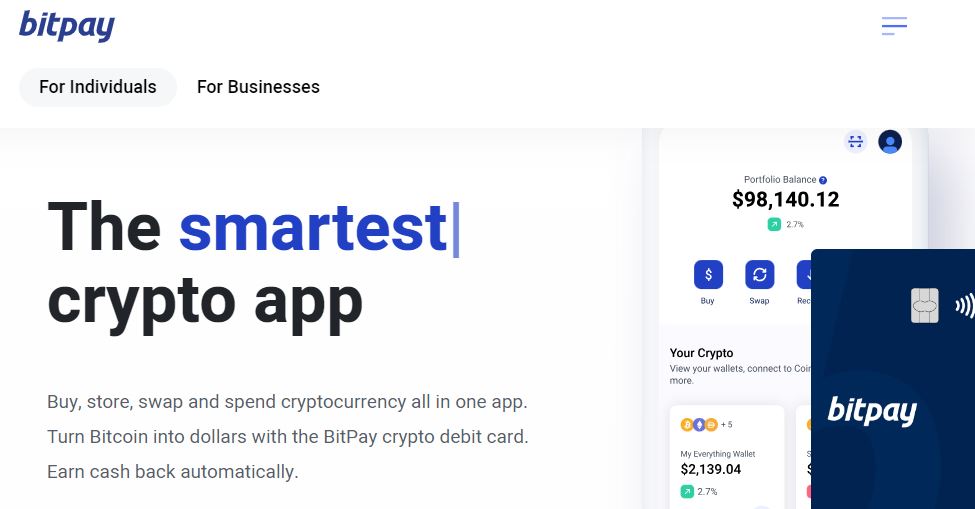
BitPay is one of the pioneers in the crypto payment processing industry, supporting payments in Bitcoin, Bitcoin Cash, and other popular cryptocurrencies.
Key Features:
- Instant conversion of cryptocurrency to fiat currencies.
- Supports invoices in over 40 languages, ideal for international business.
- Provides a Visa debit card to facilitate easy spending of cryptocurrency earnings.
Pros:
- Global support with multi-language invoicing.
- Strong security featuring two-factor authentication.
- Various payout options available in both crypto and fiat.
Cons:
- Limited cryptocurrency options.
- Transaction fees can be high for smaller payments.
3. CoinPayments
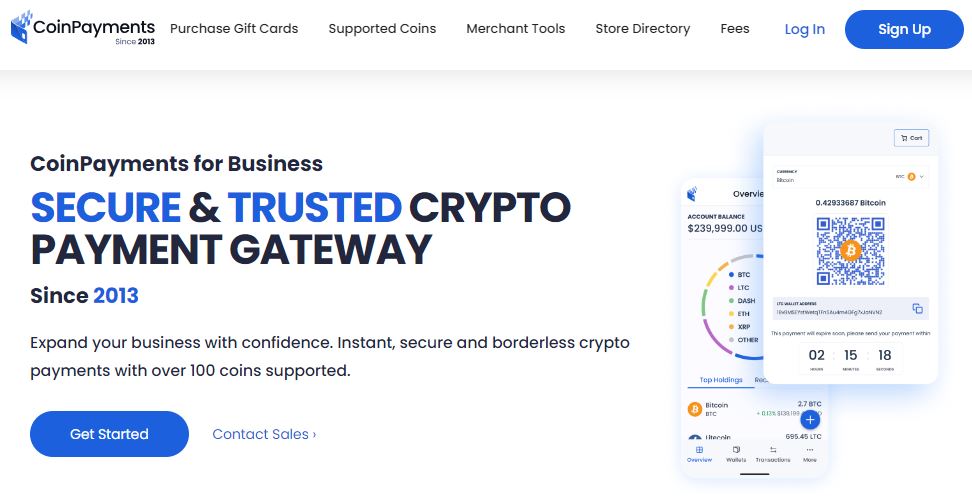
CoinPayments is a well-established crypto payment processor that supports a wide variety of cryptocurrencies, enabling businesses to reach more customers globally.
Key Features:
- Accepts over 2,000 types of cryptocurrencies.
- Automatic conversion to stablecoins or fiat currencies.
- Offers plug-ins for Shopify, WooCommerce, and Magento.
Pros:
- Extensive cryptocurrency options.
- Multi-currency wallet with vaulting for added security.
- Low transaction fees for select coins.
Cons:
- The interface may be complicated for beginners.
- Some currencies may incur higher fees.
4. NOWPayments
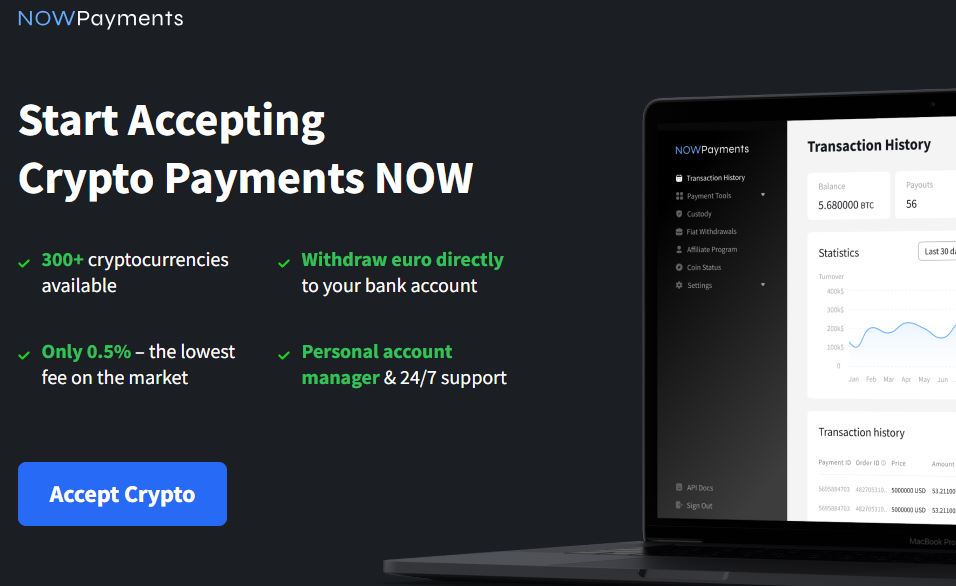
NOWPayments is a non-custodial crypto payment gateway, which ensures businesses maintain complete control over their funds. It supports numerous cryptocurrencies and offers features like automatic crypto-to-fiat conversion.
Key Features:
- Accepts over 100 cryptocurrencies.
- Non-custodial, allowing full control over funds.
- Provides various payment solutions, including POS systems, API, and donation widgets.
Pros:
- Comprehensive integration options for eCommerce.
- Full control over crypto funds.
- Simple and transparent pricing model.
Cons:
- Lacks 24/7 customer support.
- Certain cryptocurrencies may have higher fees.
5. Crypto.com Pay
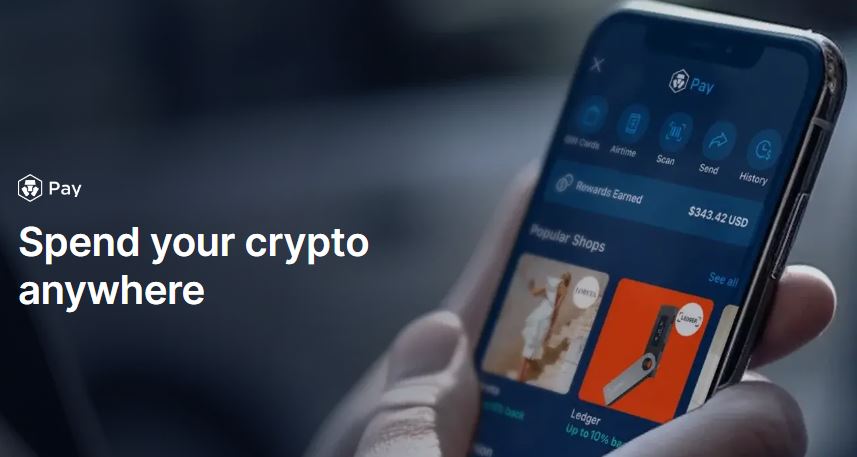
Crypto.com Pay is an innovative payment gateway linked to the Crypto.com ecosystem, enabling businesses to accept various cryptocurrencies while providing additional incentives for using the CRO token.
Key Features:
- Accepts CRO, BTC, ETH, LTC, and others.
- Incentives for using CRO with discounted transaction fees.
- Instant conversion to stablecoins or fiat currencies.
Pros:
- Flexible currency conversion options.
- User-friendly integration with Crypto.com’s app.
- Low fees for CRO transactions.
Cons:
- Limited to businesses registered with Crypto.com.
- Fewer eCommerce integrations compared to other gateways.
6. AlfaCoins
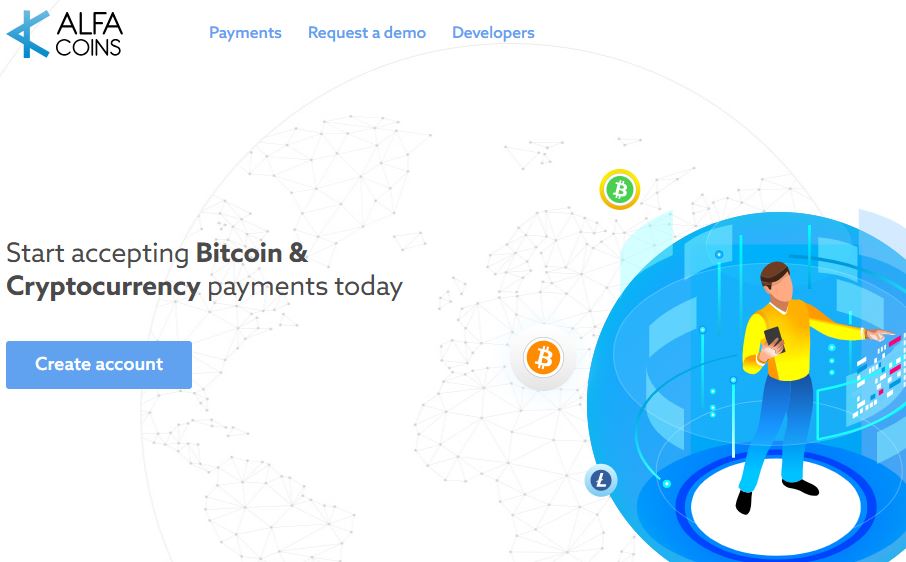
AlfaCoins is a cryptocurrency payment processor that supports Bitcoin, Litecoin, and a handful of other popular cryptocurrencies, offering competitive fees and straightforward fiat settlement options.
Key Features:
- Multiple crypto options and fiat settlement support.
- Easy integration with eCommerce platforms.
- Dual payment mode, allowing customers to split payments between crypto and fiat.
Pros:
- Flexible payment split option.
- No chargebacks, ensuring security for businesses.
- Low transaction fees.
Cons:
- Limited cryptocurrency support.
- Fewer advanced features for larger enterprises.
7. GoCoin
GoCoin provides a user-friendly gateway solution for Bitcoin, Litecoin, and several other cryptocurrencies, particularly catering to high-volume businesses.
Key Features:
- Supports Bitcoin, Litecoin, and several other cryptocurrencies.
- Easy integration with popular shopping carts.
- Flexible options for fiat currency conversion.
Pros:
- Known for high-security standards.
- Supports multiple wallets and payout options.
- Excellent for high-volume transactions.
Cons:
- Limited coin support.
- Slightly higher transaction fees compared to competitors.
8. BTCPay Server
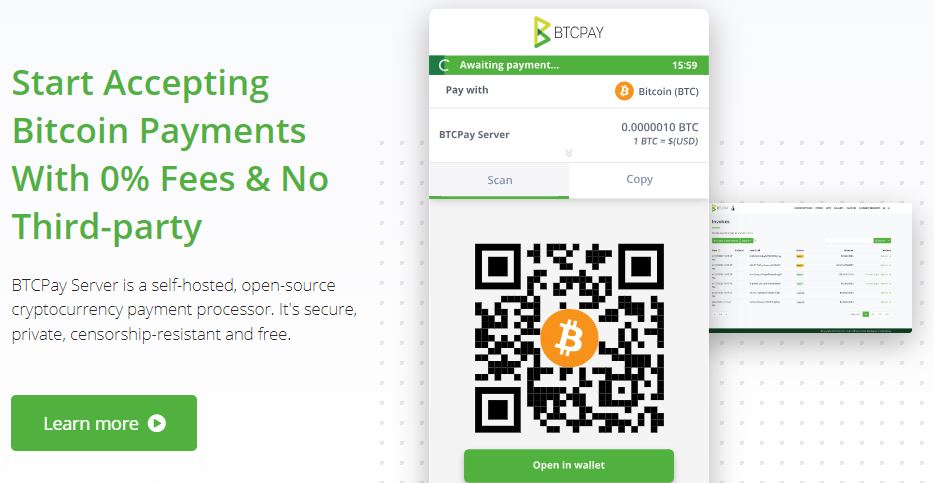
BTCPay Server is an open-source, self-hosted payment processor for Bitcoin and other cryptocurrencies, offering high customizability, making it ideal for tech-savvy business owners.
Key Features:
- Fully open-source and self-hosted, providing complete control.
- Zero fees (excluding network fees).
- Supports various integrations, including eCommerce platforms.
Pros:
- Full control and customization options.
- Zero processing fees.
- High-security protocols with multi-signature options.
Cons:
- Requires technical knowledge to set up and maintain.
- Limited support for altcoins.
Also Read: What is WooCommerce
9. TripleA

TripleA is a Singapore-based cryptocurrency payment gateway that emphasizes regulatory compliance, making it a trusted choice for businesses in the Asia-Pacific region.
Key Features:
- Real-time crypto-to-fiat conversion.
- PCI-DSS compliance ensuring high security.
- Simple integration with various eCommerce platforms.
Pros:
- Regulatory compliance enhances trustworthiness.
- Zero chargeback risk.
- Competitive fees.
Cons:
- Limited cryptocurrency support.
- Only available in select countries.
10. Blockonomics

Blockonomics offers a decentralized approach to Bitcoin payment processing, allowing businesses to manage their funds independently without needing a third party.
Key Features:
- Fully decentralized, with a direct-to-wallet model.
- No KYC requirements, enhancing privacy.
- Integration with various shopping carts.
Pros:
- Low fees with no third-party dependency.
- Focus on privacy and independence.
- Offers invoicing and eCommerce plug-ins.
Cons:
- Limited to Bitcoin only.
- No fiat currency support.

Final Thoughts on Crypto Payment Gateways
Each crypto payment gateways has its unique strengths and caters to various types of businesses. For those in search of extensive coin support, CoinPayments is a strong option, while BitPay and Coinbase Commerce are more reliable for those prioritizing security and regulatory compliance. Ultimately, choose a gateway based on your business’s specific requirements—such as cryptocurrency preferences, ease of integration, and fee structures—to best serve your international customer base.
Interesting Reads
10 Best Google Reviews Plugins for WordPress in 2024
10 Best SEO WordPress Plugins for News Sites
How to Sync Product Attributes to Form Fields in WooCommerce



